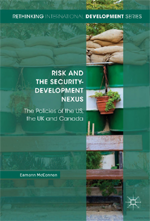
International Development; Critical Security; Development/Security; Migration; Fragile States
Biography
 Eamonn received his PhD in 2015. His thesis The security-development nexus as risk management: a multiple-donor case study of the coordination of security and development in US, UK and Canadian policy was examined by Prof. Rita Abrahamsen of the University of Ottawa. His book, Risk and the Security-Development Nexus: The Policies of the US, the UK and Canada, is published by Palgrave Macmillan.
Eamonn received his PhD in 2015. His thesis The security-development nexus as risk management: a multiple-donor case study of the coordination of security and development in US, UK and Canadian policy was examined by Prof. Rita Abrahamsen of the University of Ottawa. His book, Risk and the Security-Development Nexus: The Policies of the US, the UK and Canada, is published by Palgrave Macmillan.
In 2000 Eamonn completed his BA in Archaeology and Sociology (2.1) from University College Dublin, before going on to work in commercial archaeology. He developed an interest in international studies through his volunteer work, with Oxfam and the Vincentian Refugee Centre, and returned to education in 2009 to pursue an MA in International Security and Conflict Studies in Dublin City University (1st class honours).
Eamonn worked as a project manager on PESTUGE, a three year long Erasmus + funded project to establish MA programmes in Peace and Conflict Studies at four universities in the Republic of Georgia from 2015-2018. He also worked as Communications Officer at the IICRR from 2015-2018. His research interests are: the merging of development and security, the use of development aid for conflict prevention and resolution, failed states and security and development in Africa.
Contact Details
Recent Publications:
- McConnon, Eamonn (2018) Risk and the security-development nexus: The policies of the US, the UK and Canada. London: Palgrave Macmillan
- McConnon, Eamonn (2019) ‘The Security-Development Nexus in Ireland’s Foreign Policy: Challenges and Opportunities’ Irish Studies in International Affairs, Vol. 29 (Forthcoming)
- McConnon, Eamonn (2014) ‘Security for all, Development for Some? The Incorporation of security in UK Development Policy.’ Journal of International Development, 26(8): 1127-1148.
- McConnon, Eamonn (2014) ‘Fighting Poverty to Fight Terrorism: Security in DfID’s Development Policy During the War on Terror’ Forum for Development Studies, 41(1): 135-157.



